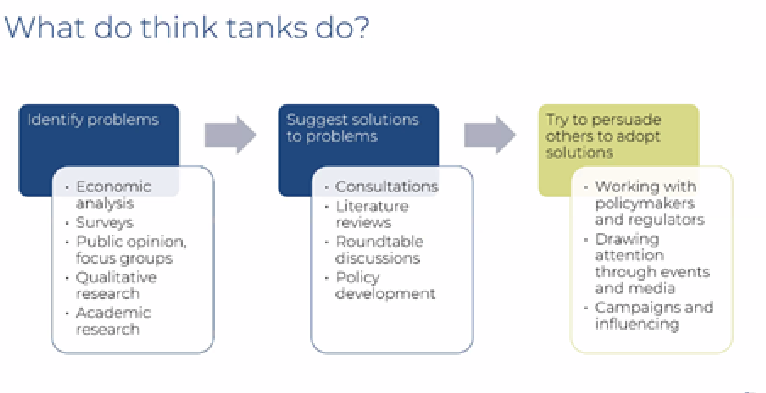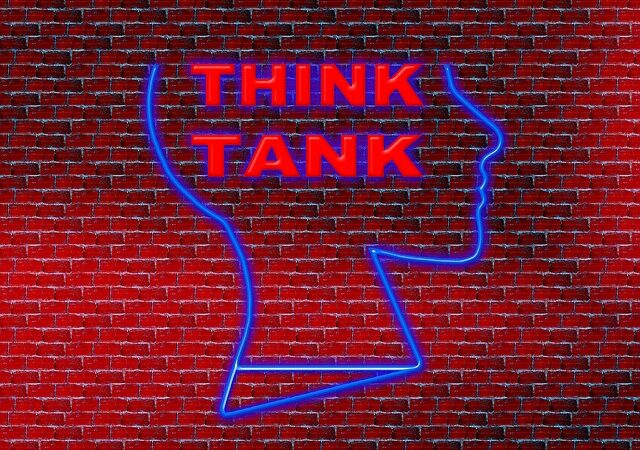Thanks to Matt Vickers, Careers Consultant (Engineering and Maths) for this comprehensive overview on working in think tanks.
Matt attended the recent “Working in the Think Tank Sector” event, organised by the Resolution Foundation – a UK think tank which aims to improve the standard of living of low and middle-income families. The event was supported by 27 speakers from 19 organisations (two of whom were Edinburgh graduates). While organised for BAME students to help increase diversity, the information and learning provided was applicable to any student wishing to learn more about the sector.
What are think tanks?
Think tanks – or policy research institutes – operate in the UK and globally. They aim to influence policy and social issues locally, regionally, nationally and internationally by persuading politicians, policy makers, journalists and the public of the merits of their research and thinking. They work on issues such as:

The following image summarises clearly the three stages of a think tank’s work:

What are the common routes into think tanks?
People working in think tanks come from a surprisingly wide range of backgrounds. In some instances, a specific degree subject may be required (e.g. economics for a researcher in an economic think tank), but for other roles, any degree (or even none!) may be acceptable. Speakers at the event comprised the following degree backgrounds:
- Economics & Development (7)
- History & Archaeology (5)
- Politics, PPE & Joint (4)
- Business (2)
- PR, Media & Communications (2)
- Law
- Science
- Unknown degree (2)
- No degree (3)
Having the relevant transferable skills and experience, allied to a genuine interest in/enthusiasm for research and policy can count for just as much as a particular degree.
For example:
A Director of External Affairs who studied Zoology became involved in politics and after graduation secured a full-time position with a political party as a campaign organiser (local and EU elections) then became a campaign manager (general election) before working in PR roles then in a policy and PR role in industry, before moving to a think tank.
While it is true that many working in these roles have degrees in politics, social policy etc. this reflects more the innate interests of many graduates from these subjects and a desire to apply their degrees by working in think tanks, rather than it being a particular requirement.
Is postgraduate study required?
Postgraduate study may improve your chances but is far from necessary. To put this in context, of the 27 speakers from the 18 organisations:
- 14 had masters degrees, in: Economics (4), Conflict & International Relations (2), History (2), Politics (2), Social Policy (2), Cultural Studies (1), Law (1).
- 5 had PhD degrees in: Economics (3), History (1), Musicology & Africana Studies (1).
Big vs small think tanks?
Like most employers, think tanks come in all sizes, ranging from five staff up to several hundred (e.g. Chatham House). Small-sized think tanks offer you greater visibility, so your work and its impact will be noticed! You may also have the opportunity undertake a wider variety of tasks. The down side is having less opportunity to specialise and fewer people from whom to learn. Inevitably smaller think tanks have less of a career structure, so promotions may require leaving one organisation and moving to another.
What are common job roles?
Some think tanks are independent, while others have a stated political or ideological bias (e.g. are left or right-wing). This makes it important that you research them carefully to ensure you will fit in and feel comfortable working there as well as being able to demonstrate in your application and at interview how your values and interests match theirs.
Not surprisingly, a key job role is that of researcher. Relevant job profiles to help you understand what this entails are:
Think tanks need other people too, in non-research roles. So, if you’d find working in the think tank environment exciting but don’t wish to be a researcher, there are wider opportunities in:
- Communications: Media are vital in increasing the reach of think tanks, enabling them to influence more effectively. In a small think tank the media staff have to do everything: social media; liaison with TV, newspapers, radio etc.; writing press briefings; training the researchers in PR; marketing of events etc. In contrast, the larger think tanks split these roles between specialists. It was reiterated that a PR/media degree is not required.
- Operations: there may be people looking after the think tank’s operations, including the IT infrastructure, finances (accountants), human resources (HR) and (managing the office).
What are related job roles?
If the roles sounds interesting but you wish to explore similar opportunities in other contexts beyond think tanks, you might wish to consider:
Civil Service
- Civil Service administrator
- Civil Service Fast Streamer
- Government social research officer / Government research officer
- Local government officer
Parliament
Polling
Reporting and lobbying
International
Are there global opportunities?
The concept began in the USA, which in 2020 still had more think tanks than any other nation (2,203) according to the University of Pennsylvania’s Think Tanks and Civil Societies Program, Go To Think Tank. China now ranks second (1,413), India third (612), the UK fourth (515) and South Korea fifth (412). In short, there are opportunities globally.
In addition to the think tanks themselves, similar opportunities are available in membership organisations (societies, trade associations etc.), trade unions and charities and more distantly in civil service positions and working in parliaments.
Event resources…
Six of the seven online seminars at the event (each 20-35 mins) were recorded and can be replayed via the Resolution Foundation’s website:
- Working in the Think Tank Sector Introduction
- A day in the life of a researcher
- The role of membership organisations
- Influencing Policy
- Communications and Events
- Policy work and opportunities outside of London
Further reading
- LSE Careers Service offers a good list of think tanks categorised by region.
- PubAffairs is an award-winning network for the public affairs, government relations, policy and communications industry. Its website’s resource centre includes a directory of think tanks.
- Wikipedia lists many think tanks globally.
- LinkedIn: You can search by filtering for “Think Tanks” in the Industry category (you will need to type this in). Follow think tanks of interest, as they often post jobs on LinkedIn too and it will enable you to keep abreast of their news, publications and research.
Stop Press!
If this blog post has inspired an interest in think tanks, sign up for “Policy and research careers: Working for a think tank with the IPPR” event, Thursday 1st April, 1.10pm – 1.50pm via MyCareerHub.
Hear from Edinburgh graduate Lesley Rankin about her experience working in research and for the Institute for Public Policy Research. Lesley will talk through her career and give advice to students who are interested in similar work, followed by a Q&A. This is your opportunity to find out about the job, what’s required to be successful, and strengthen your own applications.
(Image credit: Gerd Altmann on Pixabay)


